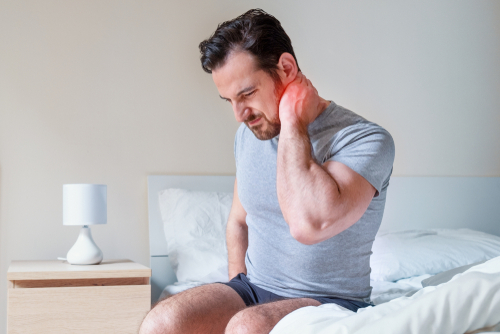Neck pain is a common issue that can significantly affect your sleep quality and overall well-being. Whether it’s a lingering soreness that worsens throughout the day or waking up with stiffness, addressing the root causes of neck discomfort is essential for maintaining a healthy sleep cycle.
In this post, we’ll explore practical strategies to help you prevent neck pain during sleep and what to do if you already wake up feeling sore.
Introduction
Neck pain, especially while sleeping, can disrupt your rest and leave you feeling uncomfortable throughout the day. This discomfort may result from poor sleep posture, an unsuitable pillow, or pre-existing tension in the neck and shoulders. Thankfully, there are steps you can take to both avoid neck pain and improve your sleep quality if you’re already experiencing discomfort. Let’s dive into some effective ways to keep your neck healthy while sleeping.
1. Choosing the Right Pillow
Your pillow plays a significant role in keeping your neck aligned with your spine during sleep. The wrong pillow can put unnecessary strain on the neck muscles, exacerbating any existing issues or even causing new pain. Here’s what to keep in mind when selecting the right pillow:
- Support: Your pillow should support the natural curve of your neck. For back sleepers, a medium-firm pillow that cradles the neck without pushing it forward is ideal. Side sleepers should look for a firmer pillow that fills the space between the shoulder and neck to keep the spine straight.
- Material: Memory foam or cervical pillows designed to support spinal alignment can be helpful, but it’s essential to find one that feels comfortable and maintains its shape throughout the night.
2. Optimal Sleep Positions
The position in which you sleep directly impacts your neck health. Some positions are more conducive to proper neck alignment, while others can strain the muscles and ligaments.
- Back Sleeping: This is often considered the best position for neck health. Sleeping on your back allows your head, neck, and spine to rest in a neutral position. Use a pillow that gently supports the natural curve of your neck.
- Side Sleeping: Sleeping on your side can also be comfortable for the neck, provided your pillow fills the gap between your head and the mattress. Avoid letting your head tilt downward or upward, which can cause strain.
- Avoid Stomach Sleeping: This position forces your neck into awkward angles and strains the muscles, often leading to stiffness and pain. If you tend to sleep on your stomach, try to gradually shift toward sleeping on your back or side.
3. Stretching and Strengthening
If you frequently wake up with neck pain, it may help to incorporate gentle neck stretches and strengthening exercises into your daily routine. Stretching before bed and after waking up can help relieve tension and increase flexibility in the neck muscles.
- Neck Stretches: Gentle stretches like the chin tuck, where you pull your head back to align it with your spine, or the side neck stretch, where you tilt your head to one side, can reduce tightness.
- Strengthening Exercises: Strengthening the muscles that support your neck can prevent future pain. Exercises like isometric neck holds, where you press your head against your hands in different directions, can improve stability.
Always consult a healthcare professional or physical therapist before beginning any exercise regimen, especially if you’re experiencing ongoing pain.
4. Managing Pain if You Wake Up Stiff
If you wake up with neck pain, there are several strategies to ease the discomfort and start your day without additional strain.
- Heat or Cold Therapy: Applying a heating pad or taking a warm shower in the morning can help relax stiff muscles. Alternatively, if the pain feels more acute or inflammatory, a cold pack may reduce swelling and numb the discomfort.
- Posture Correction: Poor posture during the day can aggravate neck pain. Throughout the day, focus on keeping your spine straight, shoulders relaxed, and ears in line with your shoulders to relieve tension.
- Over-the-Counter Remedies: Non-prescription pain relievers like ibuprofen or acetaminophen can help manage acute discomfort. However, if you rely on medication frequently, consider seeking a professional evaluation.
5. Falling Asleep When You Have Neck Pain
Falling asleep when you’re already dealing with neck pain can be challenging. The key is to create a comfortable sleep environment that supports pain relief.
- Adjust Your Pillow: Use a rolled-up towel or a small pillow under your neck to maintain alignment and reduce pressure. If lying flat is too painful, try reclining slightly with extra pillows behind your back.
- Relaxation Techniques: Gentle breathing exercises or meditation can help ease the tension you might be holding in your neck and shoulders, making it easier to fall asleep.
- Pain Management at Bedtime: Consider using heat therapy before bed to relax your muscles or take a warm bath to ease tension. Some find topical pain relief creams helpful in managing localized discomfort.
See also: 7 Effective At-Home Remedies for Neck Pain
Conclusion
Neck pain can disrupt your sleep and affect your daily life, but with the right steps, you can minimize discomfort and protect your neck health. From choosing the right pillow to practicing stretches, these small changes can make a big difference. If your neck pain persists or worsens, it may be time to seek professional help.
At Pinpoint Health, we specialize in diagnosing and treating neck pain to help you get the restful sleep you deserve. Contact us today to schedule a consultation and begin your journey to pain-free nights.






